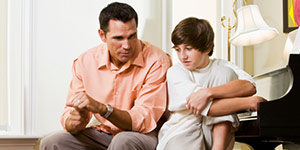Dr Debbie Ollis, a senior lecturer in health and education at Deakin University, speaksto Maryke Steffens.
No matter how uncomfortable it makes us feel, at some stage, all children will learn about sex.
Public debate on sex education often focuses on when and how children learn about sex in school and how this information should be included in the curriculum. In private, parents and carers try to figure out what they should say when they have ‘the talk’ with their kids.
Reasons given to explain this reluctance to discuss sex with young people include a concern that doing so might ruin children’s innocence, encourage an unhealthy curiosity about sex or lead to early sexually activity.
When the cervical cancer vaccine became available, for example, the age at which young women should be vaccinated for this sexually transmitted infection became a debate around this very belief – that talking about sex would lead to sex.
But is there any evidence to suggest that this is the case?
Absolutely not, says Dr Debbie Ollis, a senior lecturer in health and education at Deakin University.
“In actual fact, what a number of studies show is that by providing comprehensive sexuality education, young people actually delay the onset of sexual activity,” she says.
“And for kids who are sexually active, the research shows that they participate in much safer practices around sexual activity.”
Moreover, while the adults are busy debating how best to approach the isse, research shows children and young people are getting information for themselves from a range of sources including the internet, magazines, their friends or television.
“Kids ask age-appropriate questions,” Ollis says, “There’s this fear that if we give them too much information, we will ruin their innocence. But in actual fact, we know that by providing knowledge and understanding, we prepare them to be able to deal with issues.”
Around the world
A 2009 research review conducted by UNESCO (United Nations Educational Scientific and Cultural Organization) provides some hard data on how sexuality education can influence behaviour.
The review looked at 87 studies from around the world and found:
none of the programs led to earlier sexual activity in young people
more than a third of programs delayed sexual activity
one third of programs lead to a decrease in frequency of sex
a small percentage (3 per cent) were found to increase frequency of sex.
more than a third of programs lead to a decrease in the number of sexual partners participants had
none of the programs led to an increase in number of sexual partners.
The review also found that more than a third of the sexuality education programs increased condom or contraceptive use, while more than half reduced sexual risk-taking.
The review also analysed 11 studies on abstinence programs from the United States. In abstinence-only sex education, young people are taught that it’s best to wait – hopefully until marriage – to start having sex. Only 2 reported showing a delay in the initiation of sex and the rest showed no impact. In addition, none of these studies showed any impact on condom or contraceptive use.
Ollis says a lack of acknowledgement that young people are sexually active can have negative consequences, such as the high rates of teenage pregnancy seen in the United States.
“Yet countries like Holland, Germany and France, that have comprehensive approaches and begin sexuality education in primary schools, have the lowest teenage pregnancy rates of anywhere in the world,” she says.
‘Sex ed’ grows up
The key, says Ollis, is the type of sex education young people receive.
No longer called just ‘sex ed’, the sexuality education now taught in Australian schools covers not just the physiological facts about sex but also moral and ethical issues.
“Rather than… always being concerned with prevention of disease, prevention of pregnancy, prevention of sexual assault – even though those things are really important to include in a comprehensive program – what’s more important is that young people develop a sense that sexuality is a normal part of who we are,” she says.
The benefit of this type of education, says Ollis, is that young people are better able to make sense of what they see in the media and the world around them, and make informed decisions around issues to do with sexuality.
“That may be around being or not being sexually active; it may be around choices of contraception; it may be around issues to do with their sexual identity; it may be around issues to do with exploring the media’s sexualisation of young people or issues to do with pornography,” she says.
Education from day one
Ollis says we should be start sexuality education when children are young – and this can happen at home and at school.
At home, parents can tell pre-school children the correct name of body parts, such as penis, vulva or vagina; and start conversations about public and private behaviours.
“I’m not talking about teaching sexual practices in prep (Kindergarten), but talking about friendships and understanding your body, that should begin in prep,” she says.
Similar conversations can also happen at home and experts recommend parents:
Talk early, talk often
inform themselves before they start having the conversation
remain non-judgemental, even if they are surprised by what they find out
make it a regular topic
make the most of ‘teachable moments’, such as when you’re watching a movie or reading a book
encourage questions – and if it’s not the right time to answer your child agree to continue the conversation later (and be sure to do so)
know what’s going on for your children in many aspects of their lives.
